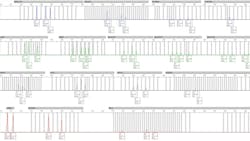Houston-based Forensic Lab Approves Mixed DNA Profile Forensic Software
WASHINGTON, DC (5/10/18) – The Harris County Institute of Forensic Sciences (HCIFS) in Houston, TX is the latest U.S. forensic lab to approve the use of STRmix™, the sophisticated forensic software used to resolve mixed DNA profiles previously thought to be too complex to interpret.
HCIFS, which provides medical examiner and crime laboratory services, including death investigations and laboratory analysis, joins 30 other U.S. labs which now routinely use STRmix™ in resolving DNA profiles. This includes everything from federal agencies such as the FBI and the Bureau of Alcohol, Tobacco, Firearms, and Explosives (ATF) to state and local agencies, including the Michigan State Police, Florida Department of Law Enforcement, and Kansas City Police Crime Laboratory.
In addition, Le Laboratoire de sciences judiciaires et de médecine légale du Quebec, a part of the Ministère de la Sécurité publique (MSP) based in Montreal, recently became the second Canadian agency to approve the use of STRmix™. Ontario's Centre of Forensic Sciences (CFS), one of the most extensive forensic science facilities in North America,approved STRmix™ use in August 2016.
“In the five short years since it was introduced, STRmix™ has moved from being an experimental technology to the broadly accepted norm in cases in which forensic DNA software is required to resolve mixed DNA profiles,” says John Buckleton DSc, FRSNZ, Forensic Scientist at the New Zealand Institute of Environmental Science and Research (ESR). “I expect use will continue to grow in the future as the software is continually improved and new features and functionality added.”
The latest version of STRmix™, introduced in mid-2017, contained new features designed to improve functionality, speed, memory, and ease of use, including multi-kit functionality which enables interpretation of DNA profiles from different test kits and a likelihood ratio (LR) batcher tool, which allows users to calculate multiple LRs from multiple reference inputs to a previously run deconvolution.
Dr. Buckleton, who developed STRmix™ in collaboration with ESR’s Jo-Anne Bright andDuncan Taylor from Forensic Science South Australia (FSSA), notes that STRmix™ has now been successfully used “in numerous U.S. court cases and thousands of cases internationally, while there have been at least 13 successful admissibility hearings in the U.S. for STRmix™.”
STRmix™ is also in various stages of installation, validation, and training in 51 other U.S. labs. Fourteen laboratories in Australia, England, Scotland, Republic of Ireland, Canada, and New Zealand are now using STRmix™.
For more information about STRmix™ visit http://www.esr.cri.nz/ orhttp://strmix.esr.cri.nz/.



